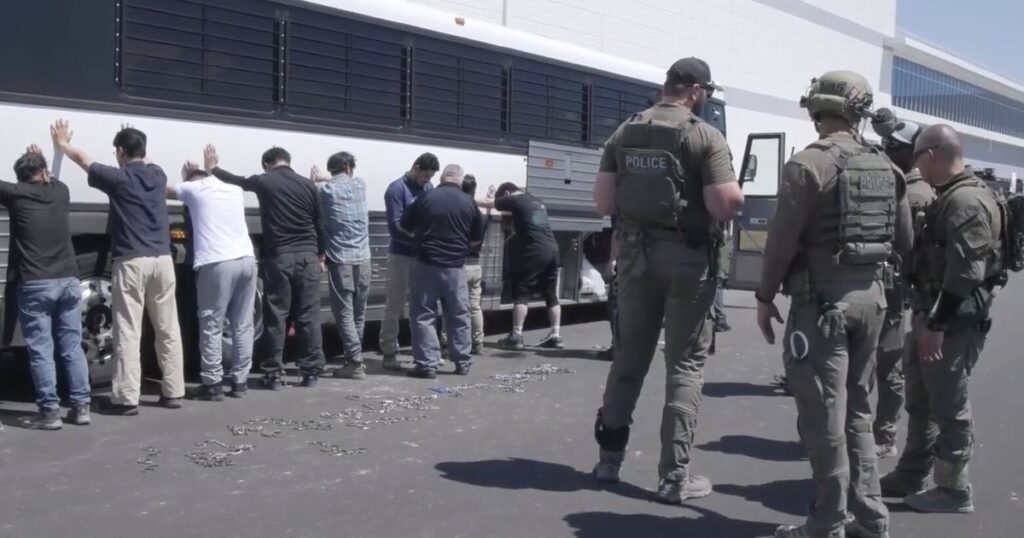South Korea’s biggest conglomerates are rushing to contain fallout from a sweeping immigration raid at a Hyundai battery venture in Georgia that’s sparked concerns over billions of dollars in planned investments.
“We are well aware of the concerns that have been raised regarding our investment in the U.S. following the immigration crackdown,” South Korea’s Trade Minister Yeo Han-koo said at a government meeting Monday. “We will work with related agencies including the Foreign Ministry to explore ways to improve the system.”
Last week’s sweeping raid shocked South Koreans after images showed workers shackled at the wrists, waist and ankles. The operation was part of a broader U.S. crackdown on suspected undocumented workers and came less than two weeks after Lee Jae Myung and Donald Trump had a summit to underscore their alliance.
They touted a trade pact that includes a $350 billion fund to help South Korean firms expand in the U.S. South Korean firms separately pledged $150 billion in direct U.S. investment in an effort to boost trade ties between the nations.
But the sweeping immigration action is making some companies cautious.
LG Energy has tentatively decided to postpone the start of its EV battery plant with Hyundai in Georgia, the Korea Economic Daily reported Monday, without saying where it got the information. Hyundai has banned all U.S. trips by its staff, the newspaper said.
LG Energy had initially planned to begin production later this year, with the goal of churning out batteries totaling 30 GWh annually, but decided to push that back to the first half of next year, the publication said, saying it would likely affect production plans for Hyundai and its affiliate Kia.
An LG Energy spokesperson said Monday the company had already delayed the start of production to next year, instead of this year, due to market conditions, adding it is too early to say whether last week’s events will affect the plant’s operations. A Hyundai and Kia spokesperson, when asked about the news report, said it is too soon to determine any effect on its business.
Even before last week’s raid, some companies were growing wary. In May, Samsung issued internal guidelines on U.S. business travel under the short-term ESTA visa, telling employees trips should not exceed two weeks, a company spokesperson said.
Rising risks
The raid underscores the risks for foreign firms that rely on subcontractors to plug workforce gaps while waiting months for U.S. visas to clear.
In a meeting with the ruling party leadership, SK Group Chairman Chey Tae-won, who leads the Korea Chamber of Commerce, urged the government to secure U.S. visa quotas to ensure smooth business operations and prevent similar incidents from recurring.
Initial investor reaction in Seoul was muted, with LG Energy and Hyundai Motor shares only slightly lagging the broader market. Analysts said potential delays at LG Energy had been well flagged, while Hyundai has flexibility to adjust EV output and tap other suppliers.
Still, one investor said that concerns over the profitability of South Korean companies’ investments in the U.S. are growing.
“The case demonstrates how tough it has become for Korean companies to make money from the investments in the U.S.,” said Kang DaeKwun, chief investment officer at Life Asset Management. “Return on investment was already getting low due to inflation and now companies face hiring challenges as well.”
The high-profile immigration enforcement operation — the largest single-site action in the history of the Homeland Security Department’s investigative arm — also risks deterring South Korean businesses’ private expansion plans.
“We are at a very difficult situation,” President Lee said at a meeting with rival party leaders in Seoul, without directly referring to the detention of South Korean citizens in the U.S. “I have often said in public in the course of holding summits with the U.S. and Japan that we must strengthen our national power, and there is a reason for saying that.”
Investors will soon get their first glimpse of the state of relations early this week, as Foreign Minister Cho Hyun is expected to depart for Washington, D.C., on Monday to seek the release of 300 South Korean citizens detained in the raid. Seoul is working to repatriate its citizens on a chartered flight under a voluntary departure arrangement, a government official said. Asked whether he will be returning home with the 300 detainees on Wednesday, Cho said “we are not ruling that out” adding “we’ll need to see how the negotiations go.”
Meanwhile, Trump urged businesses to respect U.S. immigration laws.
“We encourage you to LEGALLY bring your very smart people, with great technical talent, to build World Class products, and we will make it quickly and legally possible for you to do,” he said in a Truth Social post.
The Georgia facility is a cornerstone of the U.S. effort to secure domestic EV supply chains. Beyond its diplomatic importance, the delay adds fresh risk for automakers counting on battery deliveries to meet production targets.
Mass-producing the EV batteries from 2026 has become impossible due to the exit of key talent during the installation and trial production period, Yuanta Securities analyst Anna Lee said in a report. She expects a delay of at least a year due to the diplomatic solutions required in the absence of other visa options for workers.
Still, the effect on earnings would be limited because LG Energy has already warned of possible delays in production, she said.
Bloomberg’s Soo-Hyang Choi and Kazunori Takada contributed.

